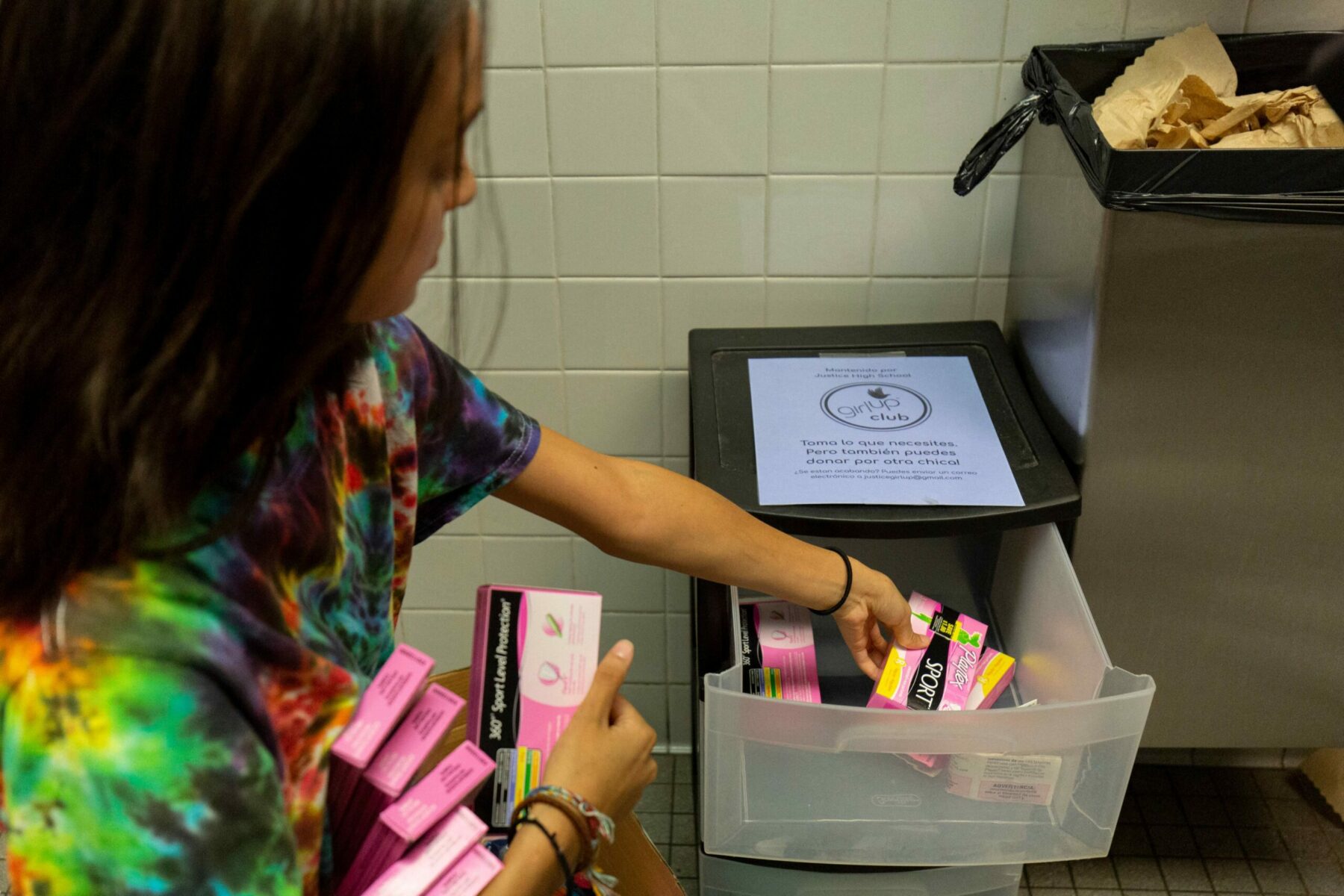When Austin public school students return to classes this month, they will find a new amenity awaiting them in the bathrooms: dispensers of free maxi pads and tampons.
Over the summer, Austin Independent School District spent about $85,000 on dispensers and $70,000 on the first batch of menstrual products to provide to students at no cost. Austin is the state’s fifth-largest district and joins Fort Worth, which will also offer supplies to students for free this fall, following a decision Dallas schools made last year.
The Texas districts join a national movement toward period equity, which has seen at least 23 states lift taxes on menstrual products and 17 states and Washington, D.C., require schools to give these products to students.
“We know that it’s expensive for kids; we know that it’s a necessary supply. It really is,” said Lynn Boswell, a member of Austin ISD’s board of trustees. “We provide toilet paper. We need to provide this as well to our students. It just really shows students that we see them, and we understand that need, and we don’t want anything to be a barrier to their education.”
Free sanitary napkins and tampons will be available in Austin’s middle and high school restrooms marked for girls and women as well as in gender-neutral bathrooms. Although dispensers won’t be installed in elementary school restrooms, staff on these campuses will also receive free menstrual products to distribute. They can place them in restrooms, nurses’ offices or other sites, an Austin ISD spokesperson told The 19th.
Texas doesn’t mandate schools to provide period products, but momentum is building there to make period equity a reality. Grade school and college students, teachers, nurses, activists and politicians are among those fighting to lift taxes on menstrual products in the state, or for schools to offer supplies for free. They say both strategies cut down on period poverty, a term that describes the inability to afford menstrual supplies. A study published in the journal Obstetrics and Gynecology in 2019 found that 64 percent of low-income women surveyed struggled to buy period products during the previous year, and 21 percent said they had this problem monthly. Due to a months-long tampon shortage, which has led to inflated prices, even students who aren’t economically disadvantaged may find it harder to obtain the products this year.
When students lack access to period products, it can interfere with their ability to get an education. In the United States, an estimated 23 percent of students have struggled to buy menstrual supplies, according to a 2021 study, “State of the Period: The widespread impact of period poverty on US students.” Sixty-five percent of students surveyed said they do not want to be at school when they have their periods, and 38 percent reported not being able to do their best schoolwork often or sometimes because of insufficient access to period products. A 2019 version of this study found that 84 percent of teens have missed class or know someone who has because of this issue.
Roughly 52 percent of Austin’s nearly 75,000 students are economically disadvantaged, which is why school officials believe that free menstrual products will help the community. But that’s not the only reason they’re advocating for more access.
“Lower-income families might have a harder time affording feminine hygiene products, but I think all of us have had those moments where we might need supplies where we’re not prepared,” said Michelle Wallis, executive director of Austin ISD’s Office of Innovation and Development and the Austin Ed Fund, the education foundation for the district. “Sometimes for students that causes absences from class or other interruptions to their academic learning when we could be providing this as a basic need for them. So I think it does impact students from low-income communities in a greater sense, but I think it will help all students and hopefully just reduce a barrier.”
Austin officials won’t know how much it will cost to buy products regularly until it can estimate how many of them will be used at each campus over the next three months, a district spokesperson told The 19th. The district is not relying on donations for this initiative. Instead, funding will come out of the district’s operations department budget under perishable goods, the spokesperson said.
“We have a very generous community that supports our kids in lots of different ways, but the district really saw it not as something that should be donor funded, but something that should be funded out of our operations budget because it is meeting a need,” Boswell said.

Snow White, mother of a sixth grader and an Austin Ed Fund board member, started pushing for free period products at all Austin ISD campuses during the pandemic. Her daughter, Kennedy, got her first period when classes took place online during the first wave of the COVID-19 crisis in 2020. When in-person classes resumed at Kennedy’s K-6 elementary school the next year, White was unsure how the young girl would manage menstruating on campus, so she contacted the staff to see if they could help.
“Not only did they not have feminine hygiene products available, but there weren’t any trash cans in the stalls and inside the bathrooms,” White said. “The trash cans were actually outside of the bathrooms.”
The school quickly installed trash cans inside the stalls, and White donated a cabinet filled with period products. But she didn’t want to stop there.
“If my daughter’s school doesn’t have this, what about all the other schools in Austin?” she wondered.
White began asking around, finding out that only some Austin schools had products available. She was willing to fundraise through Austin Ed Fund, but the district decided to purchase items on its own, declaring them necessities for students.
“It was just such an amazing feeling to hear that the district was willing to take that on because there are so many areas that we’re stretched thin within our district,” White said. “But for them to realize how much of a priority this is for their students was just completely heartwarming, and I was just really proud of the district at that moment.”
White now wants other school districts in the state to take on menstrual equity. In addition to the Dallas and Fort Worth school districts, Texas A&M and the University of Texas have also started providing free period products in restrooms. About 10 percent of college students struggle to afford menstrual supplies each month. But statewide policies to eliminate taxes on these products or to require schools to supply them haven’t been implemented.
Rep. Donna Howard, who represents parts of Austin, has unsuccessfully introduced legislation to remove taxes on menstrual products since 2017. Doing so would cost Texas about $42 million over a two-year budget period, according to the Legislative Budget Board. Leaders of the Texas Menstrual Equity Coalition have tried to lift the tax through the Texas comptroller’s office, arguing menstrual products should be considered wound-care dressings, such as Band-Aids, which are tax exempt. But the comptroller’s office did not agree.
Austin ISD trustee Boswell is not discouraged by the lack of statewide legislation on menstrual equity. She has faith in the grassroots movement to make period products free and accessible to all.
“There’s a powerful statewide network in Texas. We educate about 10 percent of all the kids in the country in Texas,” Boswell said. “Individual districts can absolutely take action. We don’t have to wait for the state to tell us to do what we know is right for our students. We can use a relatively small amount of resources to create a big benefit for a large number of our students.”







